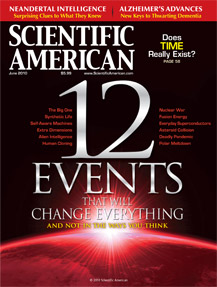How free exchange between people
increases prosperity and trust
In his 1776 work An Inquiry into the Nature and Causes of the Wealth of Nations, Scottish moral philosopher Adam Smith identified the cause in a single variable: “the propensity to truck, barter, and exchange one thing for another.” Today we call this free trade or market capitalism, and since the recession it has become de rigueur to dis the system as corrupt, rotten or deeply flawed.
If we pull back and take a long-horizon perspective, however, the free exchange between people of goods, services and especially ideas leads to trust between strangers and prosperity for more people. Think of it as ideas having sex. That is what zoologist and science writer Matt Ridley calls it in his book The Rational Optimist: How Prosperity Evolves. Ridley is optimistic that “the world will pull out of the current crisis because of the way that markets in goods, services and ideas allow human beings to exchange and specialize honestly for the betterment of all.” (continue reading…)
read or write comments (1)
Would you rather earn $50,000 a year while other people make $25,000, or would you rather earn $100,000 a year while other people get $250,000? Assume for the moment that prices of goods and services will stay the same.
Surprisingly — stunningly, in fact — research shows that the majority of people select the first option; they would rather make twice as much as others even if that meant earning half as much as they could otherwise have. How irrational is that?
This result is one among thousands of experiments in behavioral economics, neuroeconomics and evolutionary economics conclusively demonstrating that we are every bit as irrational when it comes to money as we are in most other aspects of our lives. In this case, relative social ranking trumps absolute financial status. Here’s a related thought experiment. Would you rather be A or B? (continue reading…)
read or write comments (67)
Order from Skeptic.com
ORDER the debate on DVD
In this debate on what are arguably two of the most important questions in the culture wars today — Is Religion a Force for Good or Evil? and Can you be Good without God? — the conservative Christian author and cultural scholar Dinesh D’Souza and the libertarian skeptic writer and social scientist Michael Shermer, square off to resolve these and related issues, such as the relationship between science and religion and the nature and existence of God. This event was one of the liveliest ever hosted by the Skeptics Society at Caltech, mixing science, religion, politics, and culture.
Dinesh D’Souza is the Robert and Karen Rishwain Fellow at the Hoover Institution at Stanford University. Investor’s Business Daily called him one of the “ top young public-policy makers in the country,” and the New York Times magazine named him one of America’s most influential conservative thinkers. Before joining the Hoover Institution, Mr. D’Souza was the John M. Olin Fellow at the American Enterprise Institute. In 1987–88 he served as senior policy analyst at the Reagan White House. From 1985–1987 he was managing editor of Policy Review. He graduated Phi Beta Kappa from Dartmouth College in 1983. His books include the New York Times bestseller What’s So Great About America. His 1991 book Illiberal Education was the first study to publicize the phenomenon of political correctness. He is also the author of The Virtue of Prosperity: Finding Values in an Age of Techno Affluence. D’Souza’s articles have appeared in the New York Times, Wall Street Journal, The Atlantic Monthly, Vanity Fair, New Republic, and National Review. His latest book is titled What’s So Great About Christianity? (continue reading…)
read or write comments (79)
Where do our concepts of right and wrong come from? Do humans share a moral law that transcends time and culture?
Watch the video
read or write comments (3)
Eastern and Western science are put to political uses in both cultures
In the sixth century B.C., Siddhartha Gautama — better known as the Buddha — extolled the virtues of enlightenment through a “middle path”:
Avoiding the two extremes the Buddha has gained the enlightenment of the Middle Path, which produces insight and knowledge, and tends to calm, to higher knowledge, enlightenment, Nirvana. This is the noble Eightfold Way: namely, right view, right intention, right speech, right action, right livelihood, right effort, right mindfulness, right concentration.
Twenty-six centuries later American physicist Murray Gell-Mann constructed a subatomic model he playfully called the Eightfold Way, because it consisted of eight particles with eight possible rotations. The name was a joke, he told a Caltech audience in a lecture on “Quantum Mechanics and Flapdoodle,” (continue reading…)
Comments Off on Starbucks in the Forbidden City



